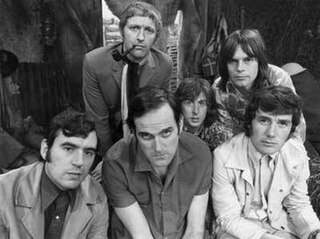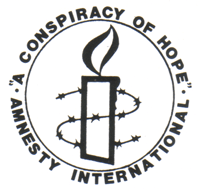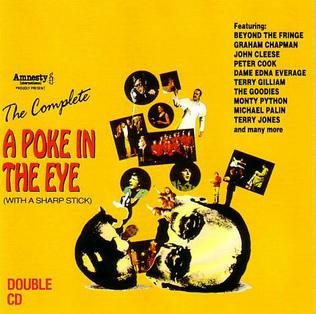
Monty Python were a British surreal comedy troupe who created the sketch comedy television show Monty Python's Flying Circus, which first aired on the BBC in 1969. Forty-five episodes were made over four series. The Python phenomenon developed from the television series into something larger in scope and impact, including touring stage shows, films, numerous albums, several books and musicals. The Pythons' influence on comedy has been compared to the Beatles' influence on music. Regarded as an enduring icon of 1970s pop culture, their sketch show has been referred to as being “an important moment in the evolution of television comedy".

Peter Edward Cook was an English satirist and comedic actor. He was a leading figure of the British satire boom of the 1960s, and associated with the anti-establishment comedic movement that emerged in the United Kingdom in the late 1950s.

I Love Lucy is an American television sitcom that originally ran on CBS from October 15, 1951 to May 6, 1957, with a total of 180 half-hour episodes spanning six seasons. The show starred Lucille Ball, her real-life husband Desi Arnaz, Vivian Vance, and William Frawley. It followed the life of Lucy Ricardo (Ball), a middle-class housewife in New York City, who either concocted plans with her best friends to appear alongside her bandleader husband Ricky Ricardo (Arnaz) in his nightclub, or tried numerous schemes to mingle with, or be a part of show business. After the series ended in 1957, a modified version continued for three more seasons with 13 one-hour specials; it ran from 1957 to 1960. It was first known as The Lucille Ball-Desi Arnaz Show and later in reruns as The Lucy–Desi Comedy Hour.
Tommy Cannon and Bobby Ball, known collectively as Cannon and Ball, are an English comedy double act best known for their comedy variety show The Cannon and Ball Show, which lasted for nine years on ITV. The duo met in the early 1960s while working as welders in Oldham, Lancashire. They started out as singers working the pubs and clubs of Greater Manchester and switched to comedy after being told comics earned an extra £3 a night. They have continued to work as a comic duo on television and in theatre and pantomime.

The Secret Policeman's Ball is a series of benefit shows staged initially in the United Kingdom to raise funds for the human rights organisation Amnesty International. The shows started in 1976 featuring popular British comedians but later included leading musicians and actors. The Secret Policeman's Ball shows are credited by many prominent entertainers with having galvanised them to become involved with Amnesty and other social and political causes in succeeding years.

Heartbeat is an English police drama series set in 1960s North Riding of Yorkshire based on the "Constable" series of novels written by ex-policeman Peter N Walker, under the pseudonym Nicholas Rhea, and broadcast on ITV in 18 series between 1992 and 2010. It was made by ITV Studios at the Leeds Studios and on location. Heartbeat first aired on Friday 10 April 1992. The 372nd and final episode aired on Sunday 12 September 2010.
"Cavatina" is a 1970 classical guitar piece by British composer Stanley Myers written for the film The Walking Stick (1970), and popularised as the theme from The Deer Hunter some eight years later. As the Italian diminutive of cavata, cavatina is a musical term frequently applied to any simple, melodious air.

A benefit concert or charity concert is a type of musical benefit performance featuring musicians, comedians, or other performers that is held for a charitable purpose, often directed at a specific and immediate humanitarian crisis.

A Conspiracy of Hope was a short tour of six benefit concerts on behalf of Amnesty International that took place in the United States during June 1986. The purpose of the tour was not to raise funds but rather to increase awareness of human rights and of Amnesty's work on its 25th anniversary. The shows were headlined by U2, Sting and Bryan Adams and also featured Peter Gabriel, Lou Reed, Joan Baez, and The Neville Brothers. The last three shows featured a reunion of The Police. At a press conferences in each city, at related media events, and through their music at the concerts themselves, the artists engaged with the public on themes of human rights and human dignity. The six concerts were the first of what subsequently became known collectively as the Human Rights Concerts – a series of music events and tours staged by Amnesty International USA between 1986–1998.

Martin Neil Lewis is a US-based English humorist, writer, radio/TV host, producer, and marketing strategist. He is known for his participation in a variety of projects in the arts and entertainment worlds including his work as the co-creator and co-producer of the Secret Policeman's Balls benefit shows for Amnesty International and as a comedic performer and writer on American TV. He hosts his own daily radio show, heard in America on Sirius Satellite Radio and worldwide on Sirius Internet Radio. He is an occasional contributor to The Huffington Post website.
The Secret Policeman's Ball was the third of the benefit shows staged by Amnesty International to raise funds for its research and campaign work in the human rights field. In later years, other Amnesty benefit shows also bore the Secret Policeman's title. They are informally referred to as The Secret Policeman's Balls.

The Secret Policeman's Ball 2006 was the title of the show staged as a benefit for human rights organization Amnesty International at London's Royal Albert Hall in October 2006.

A Poke in the Eye is the title of the first show in what later became the iconic Secret Policeman's Ball series of benefit shows for human rights organization Amnesty International, although it pre-dated by three years the first show to bear that name. The film of the show was titled Pleasure At Her Majesty's which is sometimes mistakenly thought to be the title of the actual benefit show.
The Secret Policeman's Other Ball was the fourth of the benefit shows staged by the British Section of Amnesty International to raise funds for its research and campaign work in the human rights field. It was the second of many shows to bear the celebrated "Secret Policeman's" title that became the iconic series known informally as The Secret Policeman's Balls.
The Secret Policeman's Ball 2008 was a show in the Secret Policeman's Balls series of benefit shows for Amnesty International.
This is a list of audio, video and film releases of The Secret Policeman's Ball series of charity shows.

The Human Rights Concerts is the collective name informally used to describe the series of 28 rock concerts presented worldwide 1986-1998 to raise funds for – and awareness of - the Nobel Peace Prize-winning human rights organization Amnesty International.
Springtime! is a boutique entertainment company established in the UK in 1977 and based in the United States since 1983. The company's activities encompass film, TV, radio, record and stage show production, entertainment marketing & publicity and talent management. The company has produced and marketed audio recordings, films, TV specials and music videos. It is periodically active as a record company releasing its own audio productions and acquisitions.
The Secret Policeman's Ball 2012 was the title of the show staged as a benefit for human rights organization Amnesty International at New York City's Radio City Music Hall on 4 March 2012, it was one of the long-running series of similar Amnesty benefits.









